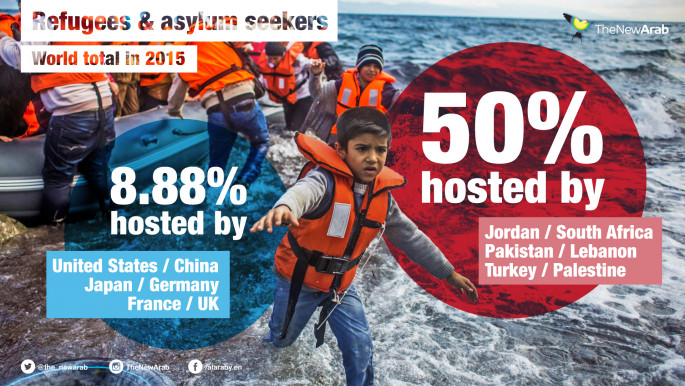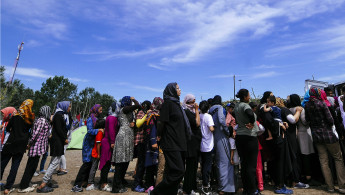The Refugee Crisis in Europe: One year on
Last year a tragic series of events involving refugees and migrants compelled a Europe that had largely been engaged in offering short term palliative solutions for refugees in camps in the Middle East, into adopting a more sustained and committed response to the main source of the crisis – the fallout from war in Syria and Iraq.
The first signs of this European policy shift had its origins in April 2015 following a tragedy in the Mediterranean.
The sinking of a ship with over 800 refugees and migrants on its way from Libya to Europe caused international consternation.
Nowhere were the reverberations of the catastrophe more acute than in Italy, where Prime Minister Mateo Renzi’s subsequent heartfelt declaration that Europe was turning its back on refugees encapsulated not only his anger but his nation’s, and their collective frustrations.
Brewing for some time these feelings were brought to fore in the aftermath of the tragedy. Italian anger was compounded, perhaps justifiably, by the feeling that Europe had shirked its humanitarian responsibility in the Mediterranean.
A fact that appeared glaring to Italians who almost daily witnessed images beamed across to them from Sicilian ports of their navy’s valiant, and solitary, Mare Nostrum search and rescue effort.
To many in Italy, the deaths in April seemed agonisingly avoidable, with the feeling that such a large scale tragedy could have been pre-empted had the EU answered the call by the Italian government for assistance in funding Mare Nostrum.
The Italian initiative ended in October 2014 and was replaced with Operation Triton, a search and rescue outfit three times smaller than Mare Nostrum and with a much reduced search and rescue mandate.
Unlike Mare Nostrum’s Mediterranean wide search and rescue programme, Triton focused only on search and recovery off the Italian coast.
 |
Twenty years ago, we and Europe closed our eyes to Srebrenica. Today it’s not possible to close our eyes again and only commemorate these events later - Italian Prime Minister Mateo Renzi |
 |
The reduction in capabilities coupled with fatefully misplaced optimism by those attempting to make the perilous journey that Italy and its EU partners would continue to offer them assistance, led to a swell in the number of refugee and migrant deaths in the Mediterranean.
The International Organisation for Migration (IOM) recorded a 30 fold increase in deaths in April 2015 compared to the same period in 2014.
Prime Minister Renzi compared Europe’s inaction to the continent’s failings at Srebrenica, when in 1995 Bosnian Muslims were handed over by a Dutch battalion under the command of the UN to Serb forces, despite being under international protection, and later summarily executed.
Renzi declared agitatedly in a press conference: "Twenty years ago, we and Europe closed our eyes to Srebrenica. Today it’s not possible to close our eyes again and only commemorate these events later".
The slaughter of over 8,000 people in Europe under the nose of a multinational force is an act that still sits heavily on Europe’s joint conscience.
The Italian prime minister’s calling upon his neighbours to avert a humanitarian disaster on the same scale as Srebrenica, coupled with the unprecedented nature of the tragedy in the Mediterranean, marked the beginnings of more robust EU policy making in dealing with the refugee and migrant crisis.
Less than a month after the tragedy EU member states agreed to settle 32,000 refugees across member states.
| Read also: Six richest countries host less than 9% of refugees |
 |
|
Last September the decision of German Chancellor Angela Merkel to bypass European asylum rules and declare her country open for Syrian refugees became a watershed moment in a constantly changing refugee crisis that was characterised by landmark proposals.
Merkel’s expedient decision came about following the vast convergence of people that had assembled at Hungary’s border with Austria in early September 2015.
Bused in by the Hungarian government in their thousands – after Budapest previously halted their progress to wealthier western European countries – the build-up of people on the border threatened to cause a major humanitarian crisis.
Fearful of the consequences of halting people at the border or the possible deaths of refugees on highways, in discussion with Austrian Chancellor Werner Faymann, Angela Merkel decided to transport thousands of people on trains to Munich.
With the promise of German largesse offered to Syrians waiting to cross the Aegean Sea, Merkel welcomed Syrians in their thousands. The considerable support that the German Chancellor received in response to exhorting her nation to accept these beleaguered masses did not occur in a vacuum.
Two tragedies involving refugees took place within a week of each other and sent shockwaves internationally.
The gruesome discovery of the bodies of 71 refugees on August 27, 2015 in an abandoned lorry in Austria and the devastating image of the washed up body of drowned Syrian toddler Aylan Kurdi on September 2 galvanised public opinion into adopting a more sympathetic and accommodating approach towards refugees and migrants.
Within a week of Aylan Kurdi’s death and following intense lobbying from the German government, the European Union announced binding and compulsory refugee quota settlement systems on all countries of the EU (with only Denmark, Ireland and the UK offered the opportunity to opt out).
The resettlement saw 120,000 refugees from Hungary, Italy and Greece distributed across the EU. Although the total number of actual refugee settlement was a lot larger, with Germany hosting over 700,000 refugees and Sweden over 100,000, by the end of 2015.
The EU’s resettlement scheme influenced a policy u-turn within the United Kingdom with British Prime Minister David Cameron announcing that the United Kingdom would take 20,000 refugees within a five year period.
Previously declaring that the UK would not resettle Syrians in the UK, Cameron instead claimed that the UK’s efforts should concentrate on offering assistance to refugees in camps in the Middle East whilst also working on a diplomatic solution to help end the conflict in Syria.
 |
Cameron instead claimed that the UK’s efforts should concentrate on offering assistance to refugees in camps in the Middle East whilst also working on a diplomatic solution to help end the conflict in Syria |  |
The imposition of border restrictions by Hungary and the threat of Balkan nations to its south following suit dovetailed with a declining appetite to accommodate refugees across Europe.
Merkel, continued to be chief advocate for Syrian refugees, and spearheaded new solutions in an attempt to quell what was growing disquiet at home and across Europe over her handling of the crisis. In October 2015 she was able to convince Balkan countries to accommodate 100,000 people until the EU were able to settle them elsewhere.
During October she also began discussions with Turkey’s president Recep Tayyip Erdogan in Istanbul that would pave the way for Turkey’s March 18 deal with the EU – for Turkey’s assistance in reducing the migrant flow into Europe it would receive accelerated visa liberalisation for Turkish nationals and increased financial support for its refugee population.
Despite these best efforts to find appropriate solutions to the refugee and migrant crisis European generosity towards refugees and its populous’ appetite to accommodate them waned further still by November 2015.
The Islamic State [IS] group was successful in declaring a propaganda coup and was able to link the terrorist attack on the Bataclan theatre in Paris in November to a Syrian perpetrator.
An IS claim that has since been proven false after it was later discovered that the passport found by one of the attackers’ had been forged.
The damage had been done and the dupes of IS were able to claim victory in reducing erst while European munificence and nuance towards refugees in favour of increasing suspicion.
Europe’s attitude towards refugees had gone full circle in a matter of months. Increasing unfeeling towards them heightened a month later by large scale sexual assaults carried out on New Year's Eve in Cologne Germany, and purported to have been carried out by refugees.
 |
Europe’s attitude towards refugees had gone full circle in a matter of months |  |
Initially reported as abuse committed by Syrian refugees it was found that almost all of the assailants were asylum seekers from elsewhere. European publics satiated with constant mistruths disguised as fact, blaming refugees for Europe’s worst terrorist attack since Madrid and now wide-scale sexual abuse, no longer had the appetite for distinction.
Conspicuous in its absence was the reporting of these facts that absolved Syrians of wrong doing in Paris and Cologne. This turn began to define Europe’s ever hardening response to the refugee crisis.
Less than one year on the refugee and migrant crisis has subsided with the UNHCR estimating that 241,000 people arrived in Europe by sea this year compared to over one million last year.
Greece, following the EU’s refugee and migrant deal with Turkey, has seen the biggest reduction with 158,000 arrivals this year compared to 857,000 last year.
Angela Merkel’s well intentioned and initial unilateral solution to the refugee crisis led to the further undermining of the EU’s credibility.
Many European governments balked at the idea of resettlement, feeling that the relocation schemes were unworkable with particular intransigence felt on the part of central European nations and their reluctance to accommodate Muslim refugees.
 |
We are monitoring every Muslim in our territory - Slovakian Prime Minister Robert Fico |
 |
Robert Fico the Slovakian Prime Minister said publicly after attacks in Paris last year: "We are monitoring every Muslim in our territory” and the Hungarian Premier Victor Orban said that Germany’s open door policy would mean “importing terrorism, criminalism anti-Semitism and homophobia”.
Dissatisfaction was also felt in Western Europe too with the United Kingdom’s shock Brexit vote from the EU and Austria’s near election of a far right leader attributed in part to the convulsions that the migrant crisis stirred.
It is too early to tell where this European pragmatism or moral vanity driven primarily by the German Chancellor, will lead the European project or indeed what kind of fate awaits Syrians in a divided Europe.
Otman Aitlkaboud is an Executive Committee member of the Arab-Jewish Forum working on improving relationships between Arabs and Jews in the UK and beyond. He formerly worked at conflict resolution think tank Next Century Foundation and for the European Union External Action service in Armenia. Follow him on Twitter: @OtmanA
Read more of his work here:



